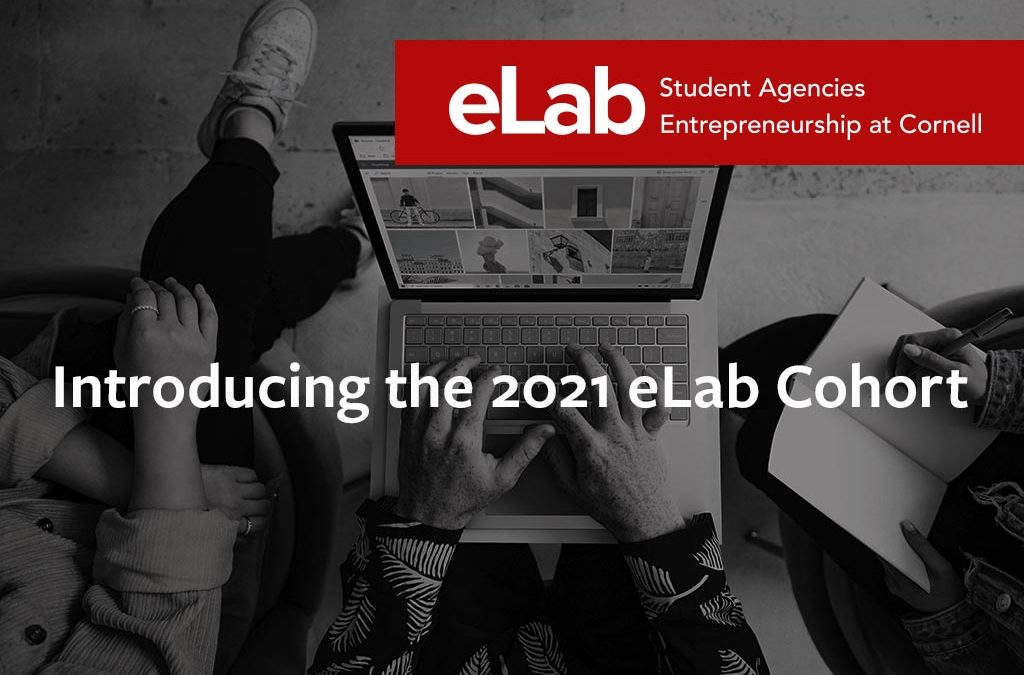Student startup accelerator eLab has selected 21 teams of student-entrepreneurs, from a pool of more than 200 applicants, for its 2020-21 cohort.
Over the course of the academic year, the rigorous for-credit program assists startups with evolving their business models by engaging in customer discovery – the important process of speaking with consumers to gather evidence for or against product-market fit – perfecting their pitches for investors and preparing for a successful launch.
Once accepted into the entrepreneurship program, participants are connected to a network of successful Cornell alumni, including experienced instructors, mentors and advisory board members who are eager to help them succeed.
“We’re excited to be a part of eLab and have the support of an engaged community of entrepreneurs to help us test our hypothesis and assumptions in order to build a better and stronger company,” said Aliyya Mattos, EMBA ’21, of eLab participant Cloud Montessori, an ed-tech startup. “We hope to build our skills and customer base, and to use eLab as a springboard toward our launch.”
This year’s eLab participants hail from a diverse set of disciplines, including the SC Johnson College of Business, the College of Engineering, and the College of Arts & Sciences.
“This cohort’s broad set of business ideas is indicative of the deep interest in entrepreneurship by Cornell students,” said Ken Rother, eLab’s managing director.
Established in 2008 by the Student Agencies Foundation and Entrepreneurship at Cornell, the eLab program has graduated many successful startups, including Combplex – a winner in the 2019 Grow-NY and 2020 76West business competitions – and ProducePay, which obtained $205 million in financing from CoVenture and TCM Capital last year.
This year’s eLab cohort and student entrepreneurs:
- Agora connects freelance visual artists with potential clients while providing integrated marketing, accounting, and legal services. Yinan Xuan, JD ’21; and Yuqing Zhang, MRP ’21.
- ai-learners is an online learning platform that helps children with disabilities learn math through personalized computer games. Ariana Gamarra ’21; and Adele Smolansky ’23.
- Atlas is developing equity in early career development with a focus on underrepresented high school and college students. Samuel Adeleye ’22; and Alexei Tulloch ’22.
- Bagasse converts food and agricultural byproducts into nutraceutical beverages for health- and eco-conscious consumers. Apratim Jash, Ph.D. ’22; and Patrick Schulz, M.S. ’19, a graduate research assistant.
- Bolt uses inertial measurement unit (IMU) sensors and motion capture technology to help hockey players improve their skating technique and increase their speed. Kyle Betts ’21; and Dan Wedman ’18.
- Cloud Montessori is a parent-focused ed-tech platform that leverages the Montessori culture of curiosity, independence, and limitless learning into the home. Aliyya Mattos, EMBA ’21; and Cheryl Chretien.
- College Tax Comeback files taxes for college students and educates students on how to utilize educational credits. Shelby Ragin ’22; and Tyler Weisman ’22.
- ElixirPX leverages AI and Natural Language Processing to transform the world of patient experience and patient feedback by giving a voice to the unheard. Aditya Narayanan ’21; Ananth Palaniappan ’21; and Abhinav Prasad ’21.
- Fello is a social, professional and creative platform that empowers college students to bring their ideas to life in a collaborative environment. Cheick Camara ’22; and Abenazar Mekete ’22.
- HEAL is a free, accessible peer chat and emotional support service for Chinese international students. Anna Hu ’22; Ruoxi Li ’22; Lin Lin ’22; and Elsie Wei ’23.
- HoverGG assists gamers in getting discovered and building their brand. Michael Maitland ’22; and Jack Stettner ’22.
- Imperium Analytics aims to democratize and facilitate equity research for new retail investors through its platform and services. Rafael Bastidas ’22; and Evan Byers ’22.
- JEL is a software solution for students and instructors that organizes material, connects topics, and fosters mutual communication to transform in-person and remote learning. Jay Chand ’21; and Eric Ma ’21.
- JustGreenz is a single-serving vegetable powder mix for soup, made of dehydrated vegetables and no additives, to help individuals consume more vegetables and sustain a healthy diet. Doctoral students Marcin Sawczuk and Annie Sheng; and Susan Lin, MBA ’21.
- Kefi Lifestyle Co. is empowering individuals from all walks of life to be their “gutsiest” selves. Eric Espinel, MBA ’21; and Trisha Grullon, Cornell IT Help Desk staff.
- Klutch is a platform that connects vehicle owners and gig economy workers so that vehicle owners can request to have their state vehicle inspection (and potentially other services) to be done at their home or place of business. Yiren Du, MBA ’21; and Marc Vainrib, MBA ’21.
- Matte Black Lounges brings premium lounges to mid-sized airports. David Nguyen, MBA ’21; and Gabe Trumbo, MBA ’21.
- Polici summarizes academic research and delivers key findings to the public. Aadi Kulkarni ’22; and Henry Manley ’22.
- QBuddy matches users based on their interests and backgrounds, using machine learning algorithms. Max Brickman ’23; Sam Brickman ’21; Max Beck ’22; Jordyn Goldzweig ’21; and Matt Zhao ’22.
- Vinstinct provides wine novices with personalized wine recommendations from local retailers. Tiffany Agard, MPA ’21; Apriele Minott, J.D. ’21; doctoral student Chelsea Stephens; and Taylor Walker, M.Eng. ’19, a Cornell lab technician.
- Vita Innovations designs and develops the VitalMask, a smart mask that provides patient data in overcrowded medical settings. Jason Chen ’22, Julia Isakov ’21, Longsha Liu ’20, and Rishi Singhal ’20.
Typically, the eLab teams present their business pitches each fall to mentors, investors and Cornell alumni at a live event in New York City. The pandemic has necessitated the shift to a virtual event on Dec. 2; more information is forthcoming on the eLab website.

